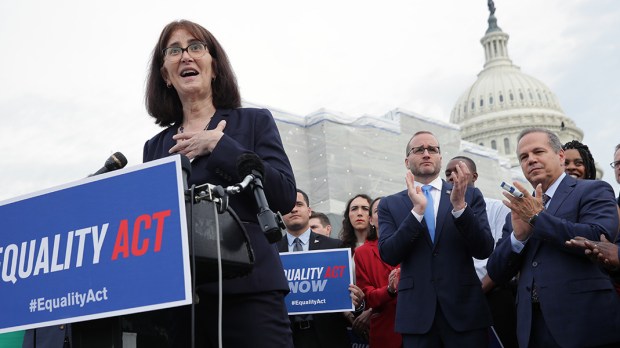Almost four years ago, on June 26, 2015, the Supreme Court of the United States ruled that the Constitution guarantees that two members of the same sex can marry.
In the four years since the Obergefell ruling, there has been increasing pressure on adoption and foster care agencies to work with same-sex couples, even when doing so contradicts the religious principles on which those agencies are based.
The Equality Act is the latest attempt to compel such agencies to act contrarily to the tenets of their faith.
“The Act’s unsound definitions of ‘sex’ and ’gender identity’ would erase women’s distinct, hard-won recognition in federal laws. Its sex-based nondiscrimination terms would end women’s shelters and many single-sex schools. It would close faith-based foster care and adoption agencies that honor children’s rights to a mother and father,” said the United States Conference of Catholic Bishops.
The Equality Act was passed by the House of Representatives this past month, but it is not expected to be taken up by the Senate this session. In an April 2019 backgrounder, the bishops’ conference said, “Children in need of foster care or adoption would have fewer service providers under the Equality Act. Because many faith-based agencies’ principles require them to seek to honor a child’s right to a mother and a father, they would be shut down. This is unconscionable as the number of children in foster care, now over 400,000, is increasing in the midst of the opioid epidemic. Contrary to proponents’ claims, the Equality Act’s nondiscrimination clauses would not widen the paths for placing children in need with families; they would do the exact opposite.”
Efforts to compel faith-based agencies are also ongoing on the state level. In Michigan, St. Vincent Catholic Charities is at the middle of one such dispute. The agency, which has partnered with the Michigan Department of Health and Human Service to place foster care children with foster or adoptive parents, is suing to reverse an April decision that they say restricts the religious freedom of the agency.
In March, Michigan Attorney General Dana Nessel reached a settlement with the American Civil Liberties Union leading to the new restriction. The settlement recognized that a 2015 law allowing state-contracted child welfare agencies to refuse to provide foster care or adoption services that conflicted with their religious beliefs violates federal anti-discrimination laws. Thus, faith-based adoption agencies in Michigan that benefit from taxpayer funding will no longer be allowed to legally turn away same-sex couples or LGBTQ individuals based on religious objection.
“The state claims this action is necessary to protect same-sex couples, but no same-sex couple has ever been unable to foster or adopt because of St. Vincent’s religious beliefs, and St. Vincent refers any couples it cannot serve to other agencies who can,” says Becket Law, a religious liberty law firm which has brought the lawsuit on behalf of St. Vincent, a former foster child and the parents of five adopted children with special needs.
“In fact, through the Michigan Adoption Resource Exchange (M.A.R.E) (the State’s central adoption portal), any foster family, including a same-sex or unmarried couple, can be connected to a private child placing agency, become a certified pre-adoptive home, and then adopt a child that is currently placed in a foster home serviced by a different agency, including St. Vincent,” the lawsuit reads.
Some states are taking legislative action on the issue. This past year, Kansas and Oklahoma passed laws to allow a religiously affiliated agency to refuse to participate in the placement of a child if doing so would violate the agency’s religious convictions without losing access to public money, according to Deseret News.
The new laws in Kansas and Oklahoma are being challenged. Kansas Gov. Laura Kelly, a Democrat who was elected in November, has said she hopes to prevent her state’s policy from being enforced.
Nationally, the Trump administration may soon be announcing new policies of its own. Axios reported administration officials as saying the White House is weighing whether to rescind Obama-era rules prohibiting funding for adoption and foster-care agencies if they refused to work with same-sex couples, or adding an exemption for religious organizations.
Trump himself said during the National Prayer Breakfast in February, “My administration is working to ensure that faith-based adoption agencies are able to help vulnerable children find their forever families, while following their deeply held beliefs.”
The administration the month before had granted a waiver to a faith-based foster care agency in South Carolina, allowing it to receive federal funds despite refusing to work with same-sex couples, non-Christians and Catholics. The ACLU is challenging that waiver.

